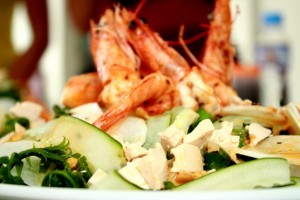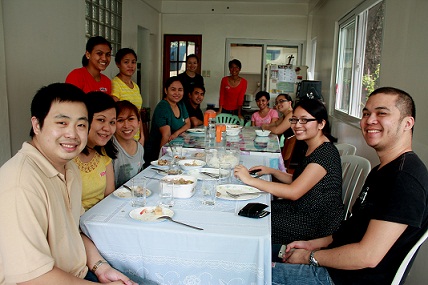By EIMOR SANTOS
 WHILE other consumers haggle for the cheapest veggies in the nearest market, soon-to-be parents Keren and James Chu go the extra mile to bring healthy organic vegetables to their table.
WHILE other consumers haggle for the cheapest veggies in the nearest market, soon-to-be parents Keren and James Chu go the extra mile to bring healthy organic vegetables to their table.
Every Saturday morning they go to a pick-up point in Loyola Heights in Quezon City—not so far from their home in Katipunan, to get their surprise basket of vegetables supplied by Good Food Company (GFC).
The prices are twice the commercial costs but the young couple think they are worth it. Food produced organically is tended without the use of toxic chemical pesticides and fertilizers. According to the World Health Organization, exposure to the chemicals found in pesticides increases the risk of fetal death and early childhood cancer during the mother’s pregnancy.
GFC is a social enterprise that has been selling the organic produce of their partner farmers in Capas, Tarlac.
The GFC labels the consumers stakeholders, buying shares of the fresh, seasonal and organic veggies through the level of commitment of their choice. At the extreme, they can opt for the “I’m a Believer Commitment” for 12 weeks, which costs P4,800 for a family size of a mix of leafy veggies and healthy staples and P2,700 for solo size. They can also give it a try for one week for only P500 or P280.
Early this year, the Chus decided to try out organic veggies. They learned that these are good especially for Keren, who is five months pregnant. “After a month we just kept subscribing,” James, a 29 year-old pastor, said.
Expensive as they may seem, they are worth the price. With organic, Charlene Tan, one of the GFC founders said people get more essential vitamins and minerals.
Besides its passion to take care of the environment and consumers’ health, the GFC shows concern for the usually bedraggled farmers as well.
Stakeholders also commit to share the risk of the farmers in case of drought or flooding, giving farmers the security and compensation they deserve.
“You’re not just a consumer… You’re a part of the whole farming process, you’re a part of this community,” Tan said of the stakeholders.
 The GFC started when a prayer group from the Christian Life Community (CLC) conceptualized the project, winning the British Council’s “I am a Changemaker” contest for best social enterprise idea in the National Capital Region in July 2010.
The GFC started when a prayer group from the Christian Life Community (CLC) conceptualized the project, winning the British Council’s “I am a Changemaker” contest for best social enterprise idea in the National Capital Region in July 2010.
The P100,000 prize money was then used by the company to start the ball rolling.
Since then the GFC has partnered with Sibol ng Agham at Teknolohiya, Inc. (SIBAT), a 25-year-old NGO from where the GFC gets the technical know-how and from where the farmers learn organic farming through its demo farm in Tarlac.
Going organic is never easy though. Of the 300 farmers in Tarlac, only 20 do organic farming.
Instead of using toxic pesticides, farmers mix mint and perla to their pest control solution and put fermented juice to leaves that are turning yellow to make them green once more.
“They also recognized that they don’t get the itchiness or the allergies or the reactions from the chemical fertilizers and pesticides,” Tan said.
The GFC used to have 70 shareholders, but today they are down to 40. A lot of them also found it real expensive and they do not even know the kind of vegetables to expect every week.
Still, the Chus would love to keep subscribing and pass this habit on to their kids. “Aside from getting good food, you are also helping the farmers in the process,” Kerren said.
The GFC especially needs to do a lot of marketing so that more people will buy and the farmers can receive more incentives. This way, the cost of the veggies will be slashed down too, since transportation and other costs will be divided among more shareholders.
“We’re kind of ahead of the awareness,” Tan said. “Not a lot of people understand why it is important to buy organic, or what’s the plight of the farmers.”
Tan admitted that before she and her family also found it too pricey to go organic. They did not even eat a lot of veggies to begin with and could not even identify leafy vegetables from one another. But ever since they learned of organic they became more willing to pay for “real vegetables.”
Recently, the GFC had its first open community kitchen event, where almost 20 shareholders and outsiders bonded and shared good food recipes with each other.
Marifi Orinoco or Ate Fe, 41, a cook for shareholder Casa Bayanihan, said she has learned a lot. She especially liked the Okra Salad recipe of Pinoy Eats World Chef Namee Jorolan, which she could cook for the American students of the study abroad program.
Tan said the GFC hopes that the Filipino passion for food and togetherness would help bring more people to the good food community.